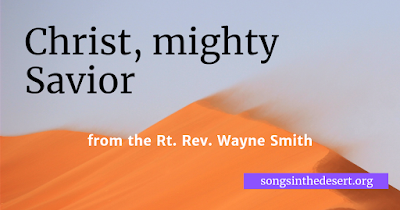Tuesday in the Second Week of Lent
Download this episode (mp3).
Songs in the Desert is an audio Lenten devotional exploring Christian hymns. Every weekday in Lent, listen to a reflection from a different contributor on a hymn that they find meaningful.Hymn numbers, when given, refer to the Episcopal Hymnal 1982. But most hymns can be found in many different hymnals.
O God, you willed to redeem us from all iniquity by your Son: Deliver us when we are tempted to regard sin without abhorrence, and let the virtue of his passion come between us and our mortal enemy; through Jesus Christ our Lord, who lives and reigns with you and the Holy Spirit, one God, for ever and ever. Amen.
Proper collects for the weekdays of Lent are from Lesser Feasts and Fasts 2006.
Subscribe to our podcast in Apple podcasts, Stitcher, TuneIn, or use our feed.
For more, visit SongsInTheDesert.org.
Theme music is "Reflections" by Lee Rosevere, distributed under a Creative Commons license.
A Sinden Production of Anglican Media (SPAM)



Transcript: Grace to you and peace in the name of Jesus Christ. I am Wayne Smith, tenth bishop of the Episcopal Diocese of Missouri, and it is my honor to contribute this episode to the podcast series, Songs in the Desert.
ReplyDeleteToday I'm talking about Hymn 35 in Hymnal 1982. It's a hymn I don't get to sing very often, partly because I don't go to sung evening services so very much and this is an evening hymn.
And secondly it is one not chosen all that often, I think partly because of the riches of evening hymnody that we have to hand in Hymnal 1982.
(organ playing some of the hymn)
This hymn comes to us from the Mozarabic tradition, one of the non-Roman rites in Western Christianity. The classic Roman rite that is the one pertaining to the City of Rome and those places directly under its influence.
During the eighth Century and prior to that the characteristic of this rite was that it was terse, direct, and unadorned. Those families of rites outside the classic Roman rite, and there were about five of them including the Mozarabic rite, were anything but terse. They were poetical rather than direct and absolutely adorned in their use of language.
The hymnody, the song from the Mozarabic rite could be extraordinarily difficult. Any presider who has ever used the Mozarabic preface for Eucharistic Prayer D will know this well. Usually a presider takes a look at that tone and runs from the room screaming. It's very difficult. And it is so very melismatic.
So this hymn text, Christ, mighty Savior, comes to us from that same non-Roman Western tradition. It comes from southern Spain, from the City of Toledo and all those places directly affected by it.
The text translated beautifully by Anne LeCroy includes such phrases as these:
describes night as 'glittering adornment'; and refers to the setting sun as 'the mirror of daybreak', which is itself the 'pledge of resurrection'.
So you can hear the poetical play in this language which is not characteristic of the rite that comes from the City of Rome and all the places affected by it.
Hymn 35 lets us pray to 'have strength for our weak hearts and rest for aching bodies'. Those phrases ring very true. And it lets us sing that 'though bodies slumber, hearts shall keep their vigil'.
(organ playing Hymn 35)
The tune in Hymn 35 is called Mighty Savior, composed by David Hurd. It fits the text rather beautifully, I think.
And here's a little fun fact to know and tell: Christ, mighty Savior is the only hymn text in the Hymnal 1982 with three tunes. It's not uncommon for a hymn to be set to two different tunes, but this one has three.
I think the text is just exactly that good. I commend it to you and I hope that you'll have occasion to sing this hymn sometime very soon.
Blessings to you.
Thanks for this!
Delete